We may not have the course you’re looking for. If you enquire or give us a call on +32 35001305 and speak to our training experts, we may still be able to help with your training requirements.
We ensure quality, budget-alignment, and timely delivery by our expert instructors.
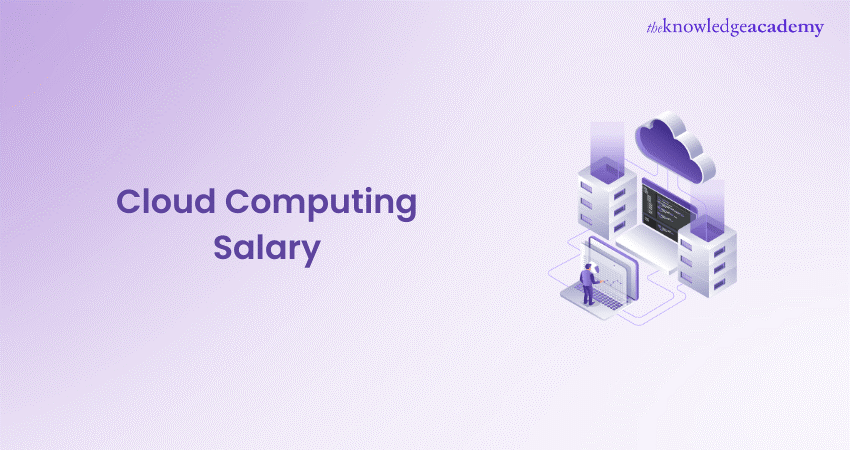
The business world's rapid migration to the cloud has fueled a surge in demand for Cloud Computing professionals, transforming the Cloud Computing salary into a goldmine for those with the right skills. Imagine a virtual toolbox accessible from anywhere via the internet – that's essentially what Cloud Computing offers. But for those considering a career in this field, understanding Cloud Computing salaries is crucial.
This blog dives deep into the various Cloud Computing job roles and their associated salaries. We'll also explore the latest trends and forecasts in the Cloud Computing Salary landscape. Ready to discover why Cloud Computing offers not only an intellectually stimulating but also a financially rewarding career path? Let's embark on this journey together!
Table of Contents
1) What is Cloud Computing?
2) Factors Affecting Cloud Computing Salary
3) Job Roles and Salary of Cloud Computing
4) Tips for Increasing Your Earnings in Cloud Computing
5) Conclusion
What is Cloud Computing?
Cloud Computing comprises of various services online, including data storage, servers, databases, networking, and software. With cloud-based storage, users can store files in a remote database and access them whenever needed. This technology supports flexibility, resource management, and cost-efficiency, providing significant advantages over local storage.
Factors Affecting Cloud Computing Salary
Here are the factors Affecting Cloud Computing Salary:
Cloud Computing Salary by Experience
Cloud Computing salaries vary significantly based on experience and role. As you gain experience, you develop the skills to engage in more complex and strategic aspects of cloud infrastructure and development projects. With increased expertise, you may take on supervisory or managerial responsibilities, overseeing other team members and guiding Project Execution.
This progression not only enhances your technical proficiency but also positions you for higher-paying roles within the industry. Advanced roles often involve strategic decision-making, project leadership, and a deeper understanding of cloud technologies, which collectively contribute to a substantial increase in earning potential.
|
Experience Level |
Average Annual Salary (GBP) |
|
Entry-Level (0-2 years) |
£30,000 - £40,000 |
|
Mid-Level (3-5 years) |
£45,000 - £60,000 |
|
Senior Level (5+ years) |
£65,000 - £80,000 |
Source: Glassdoor
Cloud Computing Salary by Industry
The Cloud Computing industry is rapidly growing, and salaries are reflecting that trend. However, salaries vary widely by industry. For example, IT professionals in the financial services industry earn more on average than those in the manufacturing sector.
The difference in salaries may partly be due to the different skill sets needed in each industry. For example, Cloud Computing professionals in the financial services industry need to handle large amounts of data and transactions quickly and securely and in a highly compliance-driven framework.
In the health care industry, you may find that the regulatory demands are less stringent, but you’ll still need to be able to ensure that patient data remains protected and confidential. The environment and demands of roles in Cloud Computing can vary. Different industries also make different levels of profit, and so that can affect wages, too.
|
Industry |
Average Annual Salary (GBP) |
|
Technology |
£65,000 - £80,000 |
|
Finance |
£55,000 - £70,000 |
|
Retail |
£45,000 - £60,000 |
|
Healthcare |
£50,000 - £65,000 |
|
Government/Public Sector |
£45,000 - £55,000 |
Source: Glassdoor
Cloud Computing Salary by Location
Salaries for computing professionals vary by country due to factors such as cost of living, demand for tech skills, and economic conditions. For instance, professionals in the United States and Western Europe typically earn higher wages compared to those in developing countries, reflecting regional economic disparities and market needs.
|
Country |
Average Annual Salary |
|
USA |
USD 119,400 |
|
Canada |
CAD 103,668 |
|
UK |
GBP 53,927 |
|
Australia |
AUD 100,000 |
|
India |
INR 814,386 |
|
Singapore |
SGD 140,000 |
|
UAE |
AED 315,000 |
Source: Glassdoor
Job roles and average salary of Cloud Computing
The field of Cloud Computing offers a variety of roles, each with distinct responsibilities and salary expectations. Below, we will explore some of the key job roles:
1) Network and Cloud Architect
Network and Cloud Architects design and implement network systems and cloud-based environments. They are critical in ensuring that cloud infrastructure is scalable, secure, and efficient. Below is a table showing the average salaries of Network and Cloud Architect in the specified countries:
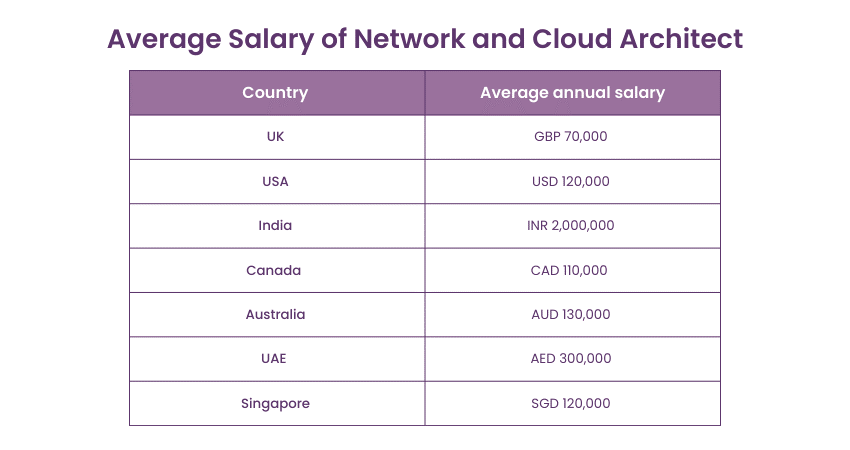
Source: Glassdoor
2) Cloud Network Engineer
Cloud Network Engineers focus on the maintenance and operation of Cloud Networking components. Their average annual salary ranges reflect the technical skills and expertise required in managing complex cloud networks. Here is a table with the average annual salary of a Cloud Network Engineer in the specified countries:
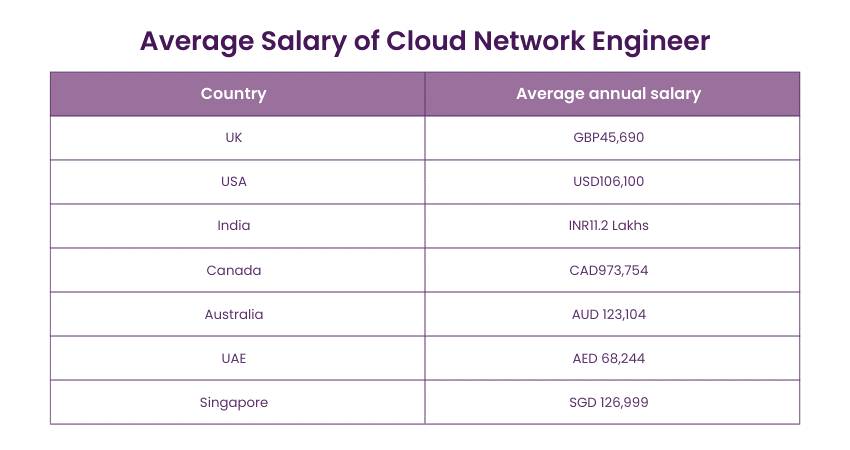
Source: Glassdoor
3) Computer Systems Analyst
Computer Systems Analysts play a key role in integrating IT systems into the cloud. They analyse and implement system requirements to ensure optimal cloud performance. Below is a table showing the average salaries of Computer Systems Analyst in the specified countries:
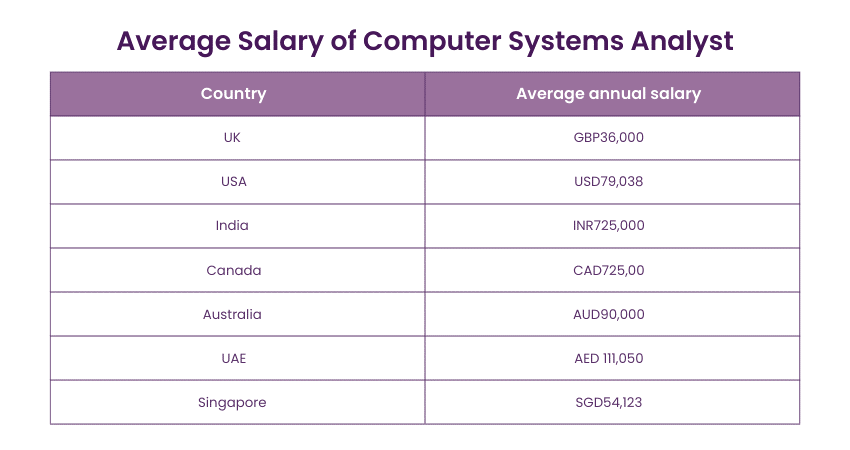
Source: Glassdoor
4) Cloud Security Analysts
As cyber threats continue to rise, Cloud Security Analysts are essential for protecting cloud infrastructure from potential breaches. These professionals earn based on their level of expertise and the complexity of the systems they protect. Here is a table with the average annual salary of a Cloud Security Analyst in the specified countries, presented in their local currencies:
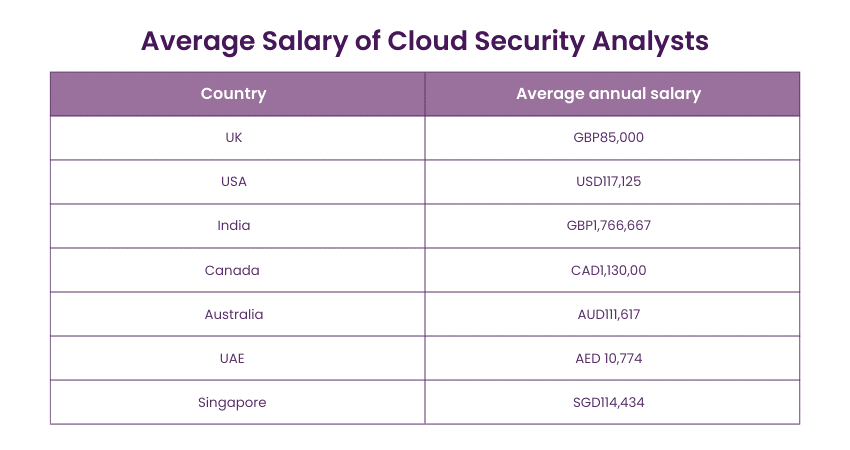
Source: Glassdoor
5) Cloud Database Administrator
Cloud Database Administrators manage and maintain database environments within cloud infrastructures. Their role is important in ensuring data integrity and availability. Here is a table with the average annual salary of a Cloud Database Administrator in the local currencies of the specified countries:
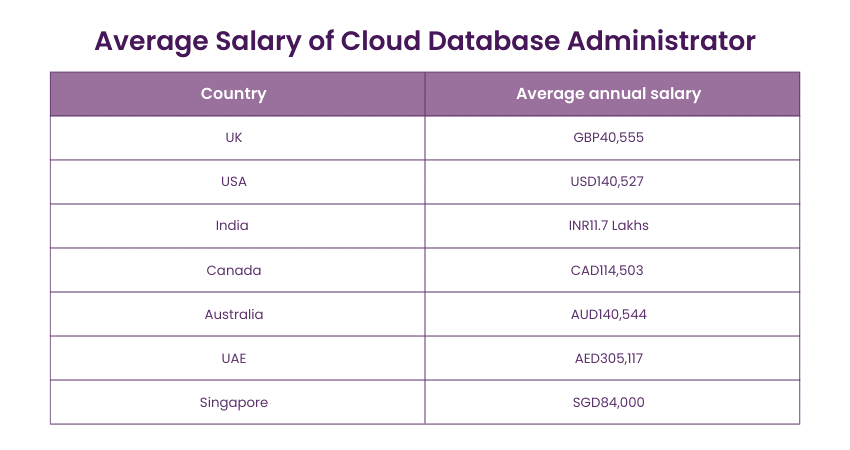
Source: Glassdoor
6) Cloud Infrastructure Engineer
Cloud Infrastructure Engineers are responsible for planning and building the foundational aspects of cloud systems. Their work ensures that the infrastructure can support the specific needs of an organisation. Below is a table showing the average salaries of Cloud Infrastructure Engineer in the specified countries:
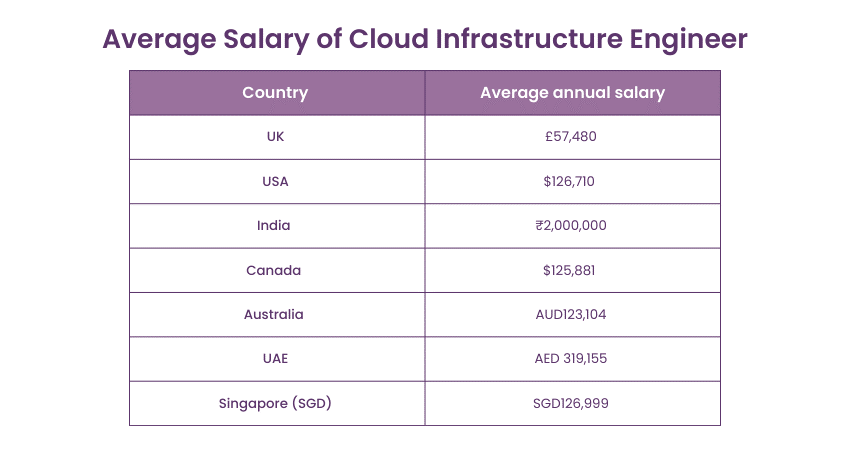
Source: Glassdoor
Gain in-depth knowledge of Microservice with our Microservices Architecture Training – join today!
7) Head of Data Science
Heads of Data Science oversee data science teams and initiatives, often working closely with cloud-based infrastructures to analyse large datasets. Below is a table showing the average salaries of Head of Data Science in the specified countries:
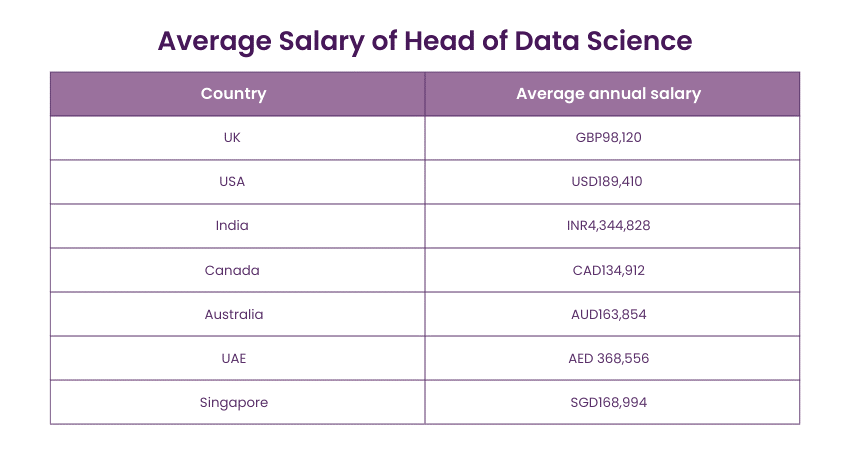
Source: Glassdoor
8) Cloud Reliability Engineer
Cloud Reliability Engineers ensure that cloud services are reliable and meet user expectations. They earn depending on their experience and the critical nature of the systems they manage. Below is a table showing the average salaries of Cloud Reliability Engineer in the specified countries:
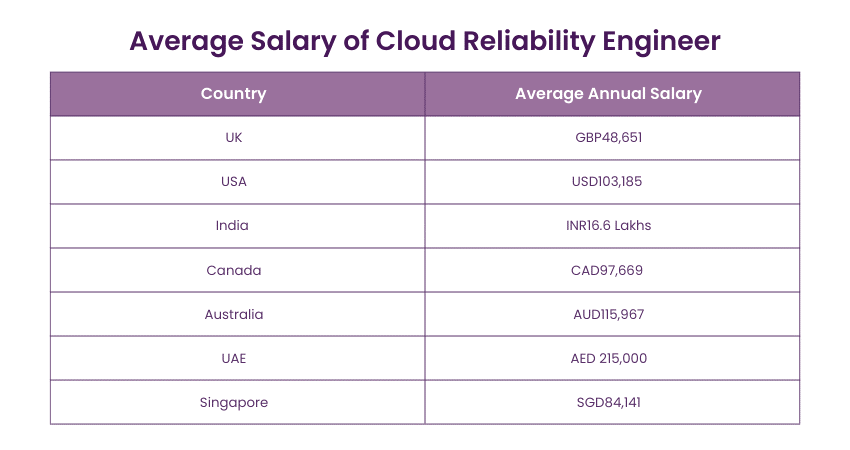
Source: Glassdoor
NOTE: Keep in mind that these numbers can vary depending on factors like years of experience, geographical location, and company for all the job roles mentioned above.
Gain insights about object storage with our Linux OpenStack Administration Course – join today!
Tips for Increasing Your Earnings in Cloud Computing
To maximise your earning potential in Cloud Computing, consider the following expanded tips:
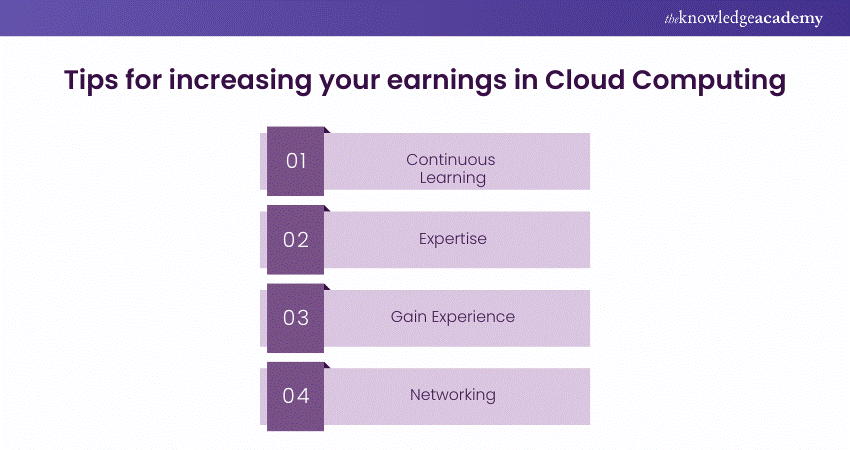
a) Continuous Learning: Cloud Computing is rapidly evolving with new technologies and methodologies. Staying updated on the latest trends and tools can enhance your competitiveness. Consider obtaining certifications from recognised bodies such as AWS, Microsoft Azure, or Google Cloud.
b) Expertise: While general knowledge of Cloud Computing is valuable, specialising in a niche area can significantly boost your worth. Focus areas like cloud security, Artificial Intelligence, and Machine Learning are in high demand.
c) Gain Experience: Experience is vital for demonstrating your capability and reliability. Engage in diverse projects to build a varied portfolio showcasing your skills across different aspects of Cloud Computing. Each project enhances your credibility and expertise.
d) Networking: Building a professional network is crucial in the tech industry. Participate in industry conferences, seminars, and workshops to connect with fellow cloud professionals. Additionally, engaging in online communities and forums can provide valuable industry insights.
Conclusion
This exploration of Cloud Computing Salary highlights the valuable opportunities awaiting those ready to dive deep into the complexities and innovations of cloud technology. As cloud technology becomes increasingly crucial across various industries, understanding the salary landscape and honing your skills is essential for tapping into the full financial rewards of this field. Keep up with the latest trends and boost your expertise to unlock your highest earning potential in the dynamic realm of Cloud Computing.
Learn how to manage Virtual Machines with our Cloud Computing Course – join today!
Frequently Asked Questions
What Degree is Needed for a Career in Cloud Computing?

A Bachelor's degree in Computer Science, Information Technology, or a related field is typically needed for a career in Cloud Computing. Advanced degrees or certifications can further enhance job prospects and expertise.
Which Companies pay the Highest Salary for Cloud Computing Roles?

Companies like Amazon Web Services (AWS), Google, Microsoft, and IBM pay the highest salaries for Cloud Computing roles. These tech giants offer competitive compensation to attract and retain top talent in the rapidly growing cloud industry.
What are the Other Resources and Offers Provided by The Knowledge Academy?

The Knowledge Academy takes global learning to new heights, offering over 3,000 online courses across 490+ locations in 190+ countries. This expansive reach ensures accessibility and convenience for learners worldwide.
Alongside our diverse Online Course Catalogue, encompassing 19 major categories, we go the extra mile by providing a plethora of free educational Online Resources like News updates, Blogs, videos, webinars, and interview questions. Tailoring learning experiences further, professionals can maximise value with customisable Course Bundles of TKA.
What is the Knowledge Pass, and how does it work?

The Knowledge Academy’s Knowledge Pass, a prepaid voucher, adds another layer of flexibility, allowing course bookings over a 12-month period. Join us on a journey where education knows no bounds.
What are the Related Courses and Blogs Provided by The Knowledge Academy?

The Knowledge Academy offers various Cloud Computing Course, including Linux OpenStack Administration Course, Microservices Architecture Course and Terraform Course. These courses cater to different skill levels, providing comprehensive insights into AWS Cloudformation.
Our Cloud Computing Blogs cover a range of topics offering valuable resources, best practices, and industry insights. Whether you are a beginner or looking to advance your Project Management skills, The Knowledge Academy's diverse courses and informative blogs have you covered.
Upcoming Cloud Computing Resources Batches & Dates
Date
 Cloud Computing Training
Cloud Computing Training
Thu 10th Apr 2025
Thu 12th Jun 2025
Thu 14th Aug 2025
Thu 9th Oct 2025
Thu 11th Dec 2025






 Top Rated Course
Top Rated Course



 If you wish to make any changes to your course, please
If you wish to make any changes to your course, please


